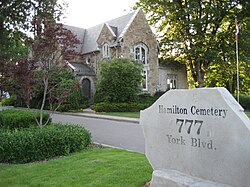| Hamilton Cemetery | |
|---|---|
 Entrance | |
 | |
| Details | |
| Established | 1847 [1] |
| Location | 777 York Boulevard, Hamilton, Ontario |
| Country | Canada |
| Coordinates | 43°16′36″N79°53′25″W / 43.276643°N 79.890186°W |
| Type | Cemetery |
| Owned by | Hamilton, Ontario |
| Size | ~100 acres [2] |
| No. of graves | 21500 |
| No. of interments | ~20 |
| No. of cremations | ~30 |
| Find a Grave | Hamilton Cemetery |
Hamilton Cemetery on York Boulevard in Hamilton, Ontario, is the oldest public burial ground in the city. It is located on Burlington Heights, a high sand and gravel isthmus that separates Hamilton's harbor on the east from Cootes Paradise on the west.


